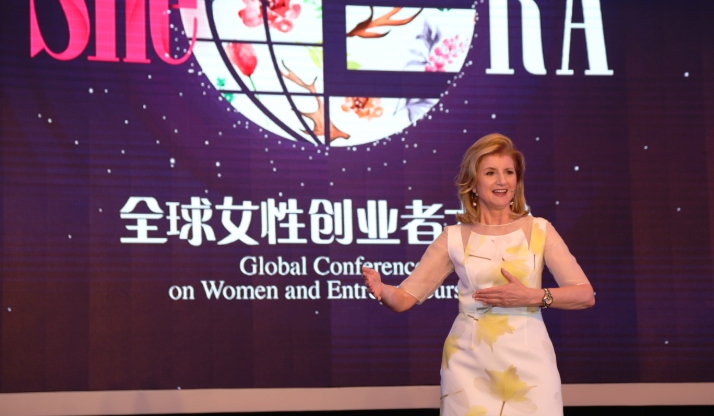
Women are making significant progress toward workplace equality, and their rising importance as an economic and social force will have a global impact in the coming decades, a gathering of some 500 female entrepreneurs were told today at a conference in Hangzhou, China.
“Analysts agree that in the next decade the impact of women on the global economy will be at least as significant as the impact of the rise of China,” said Barbara Woodward, the British ambassador to China, citing numerous signs of progress, such as more women running companies, more female Nobel Prize winners, and more inclusive employment policies by major corporations.
“This is not just the century of China, this is the She-Era,” Woodward said, referencing the theme of the conference, which was held by e-commerce giant Alibaba Group. “This is the century of women.”
Woodward,the U.K.’s first female ambassador to China,was among a lineup of speakers that included Arianna Huffington, editor-in-chief of The Huffington Post, and actress/businesswoman Jessica Albaon the opening day of Alibaba’s inaugural Global Conference on Women and Entrepreneurship, which was sponsored by the company to spark dialogue and action in encouraging more women to pursue their professional ambitions.
While the speaker’s messages were mostly upbeat, conferees told a packedballroom at The Dragon hotel in Hangzhou that much more needed to be done.
“The way the world has been designed by men, it’s not working, it’s not sustainable,” said Huffington in her keynote speech. In the still-male-dominated workplace, success is about the pursuit of money and power, Huffington said, creating an unhealthy work-life balance that women needed to help change in order to be successful.
“We see the price that we have been paying,” she said. “Heart attack, stroke, depression, health-related mental diseases ‚Ķ we’ve become so used to being exhausted all the time, it’s become the new normal.”
Huffington said about two years after she started the Huffington Post news website, one evening while she was working she collapsed, hitting her head on her desk as she fell. “As I came to in a pool of my own blood, I had to ask myself: ‘Is this what success looks like?’
“This is not the way life was designed to be,” she added. “Right now we take better care of our smartphones than we do of ourselves.” And while Huffington and other speakers agreed that technology has had a liberating effect on women, “we must learn to reconnect to our inner wisdom and peace.
“We are at an amazing turning point now when women can prove we can do everything men have done,” she said, “without buying into this collective delusion that burnout is an essential part of success. Your generation doesn’t have to make the same mistakes my generation made ‚Ķ find a place in your life with more health, more wisdom, more wonder, more giving, and yes, more sleep.”
The topic of work-life balance was a common thread throughout the conference. Alibaba Chief Financial Officer Maggie Wu, one of several top Alibaba executives who spoke during the day, told a story about how when she was pregnant she asked her doctor to speed up her delivery because her baby’s due-date fell at the same time as an important earnings announcement and conference call with analysts. Other executives offered to pitch in because of Alibaba’s “supportive and strong environment,” she said.
A daughter – Wu’s second – was born in time for her to make the conference call.
Wu noted that much of Alibaba’s success wasattributable to women, not just in the workplace but as entrepreneurs, business owners selling on the company’s e-commerce platforms and as consumers. “We have so many wonderful women who have been so persistent and who have so many colorful experiences to share. This conference is a platform where they can come to share and learn,” she said.
Alibaba Executive Chairman Jack echoed Wu’s comments, saying that he hoped the conference would evolve into a kind of “women’s Davos,” referring to the World Economic Forum’s star-studded annual meeting held in Davos, Switzerland.
Ma said his company’s proportion of female employees, which at more than 40 percent is relatively high, especially for a tech company, helped keep Alibaba “yin-yang balanced.” The company has more than 10,000 engineers, he said. “The women balance the logic with their instinct.
“We really think this is the secret sauce of Alibaba,” Ma said. “Without women there would be no Alibaba,” he said, noting that the company had a high number of women in top positions without any internal policies or programs to foster their promotionthrough the ranks. “It’s only natural.”
Alibaba’s businesses, which depend heavily on women as online shop owners and online shoppers, would continue to support their rise, Ma said. Alibaba-affiliated Ant Financial Services Group, for example, is targeting women for small business loans, he said.
That’s just good business. “If China has more women entrepreneurs, China will move from manufacturing to services,” an economic transition that is considered crucial to the country’s continued growth and development – and to Alibaba.
“In the future world, women will dominate the global economy,” Ma said. “This is just the beginning.”




